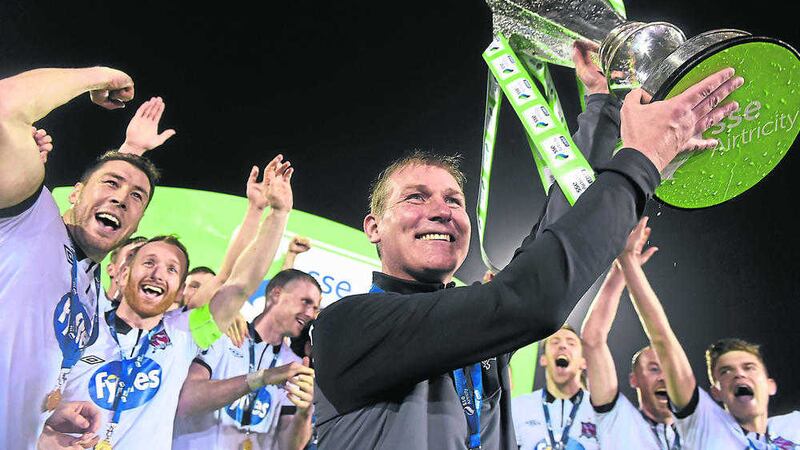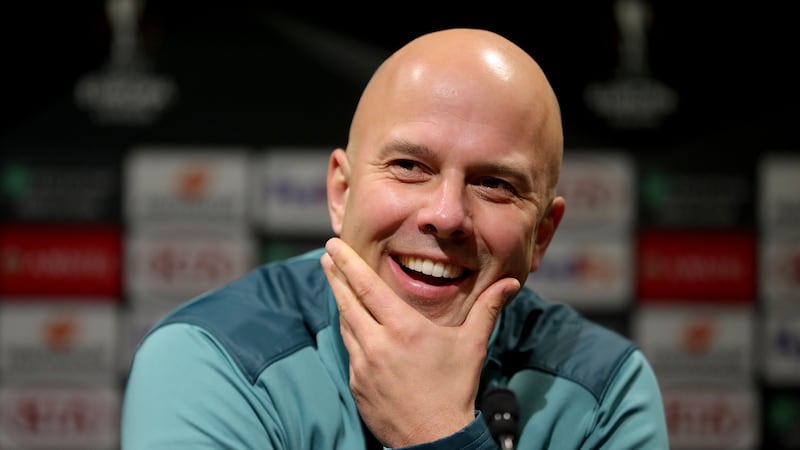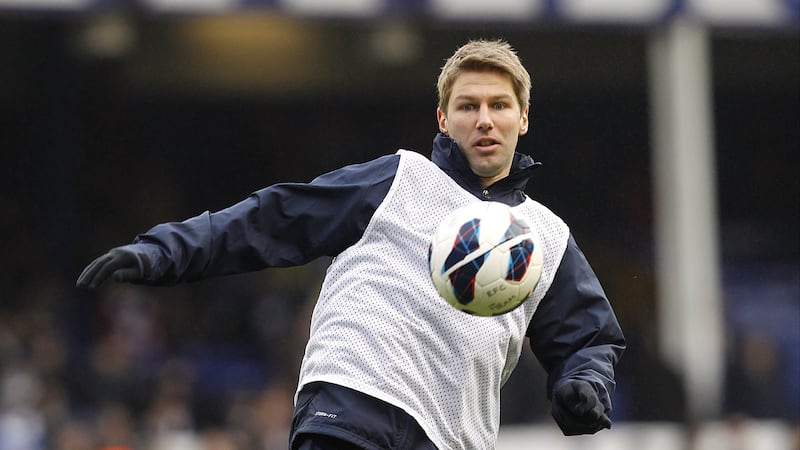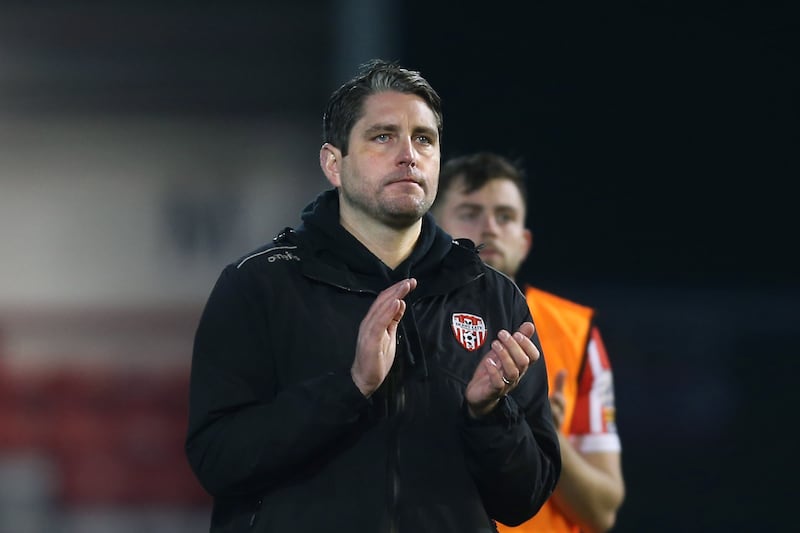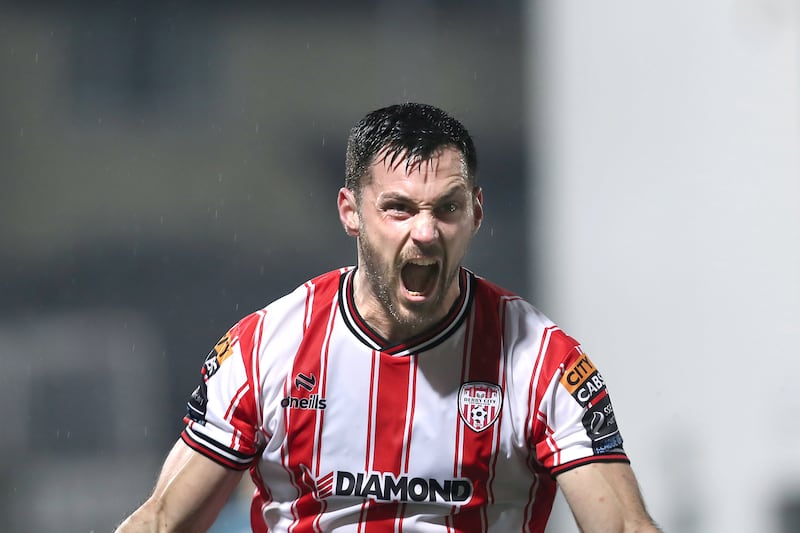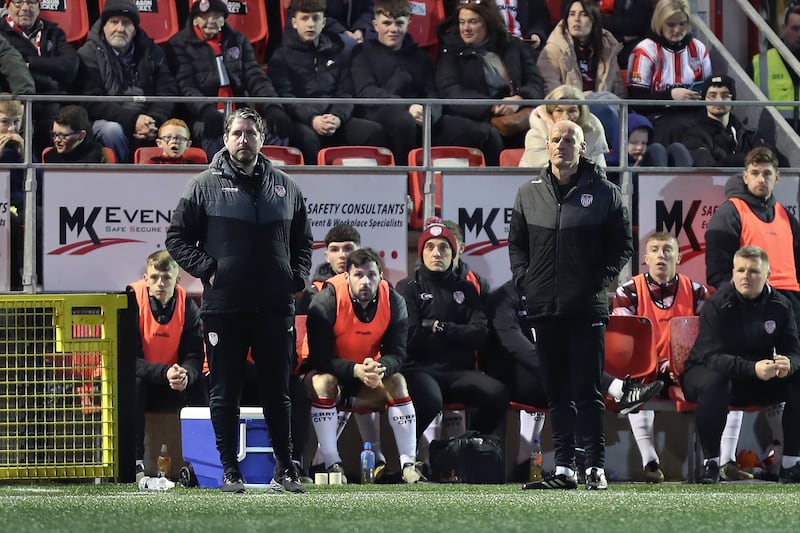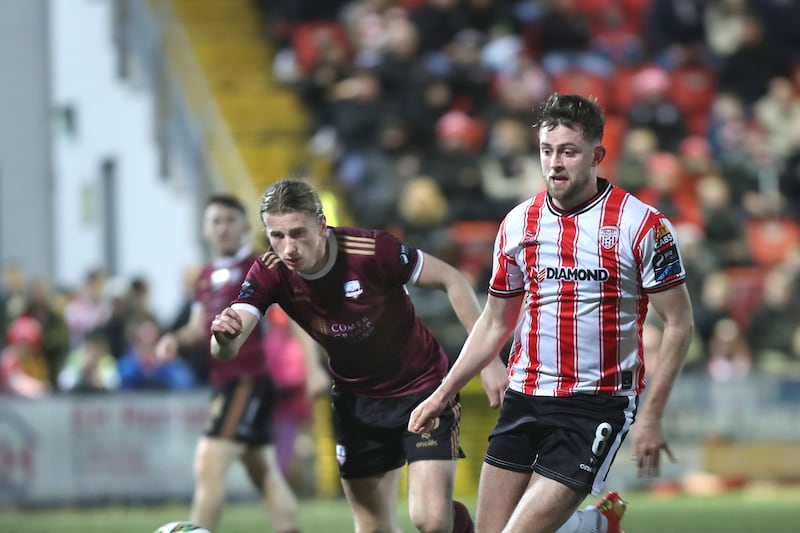FOR the third season in-a-row, a new face was leading Derry City into a new season and, unfortunately, for the second year running, Candystripes followers had another disappointing campaign.
Dundalk, under Stephen Kenny’s astute management, raised the bar again for the entire Airtricity League Premier Division. Not only did the ex-Derry gaffer have the best squad in 2014 to clinch the Oriel Park men’s first top flight title in over a decade, but he added to that panel with Gary Rogers, Paddy Barrett and Ronan Finn joining their already impressive list of players.
Another thing that Kenny and more importantly his players did was that they started the 2015 campaign the fittest team in the country.
As for things at the Brandywell, the alarm bells started to ring loud when boss Peter Hutton let striker Rory Patterson leave the club, while City’s other most deadly marksman in 2014, Michael Duffy, left to join Celtic and experienced midfielder Barry Molloy also decided to leave his hometown club.
Unfortunately for Hutton he didn’t really strengthen his squad, despite adding the likes of Anthony Elding, Seanan Clucas, Sean Houston and Cillian Morrison to name but four. Because of that, the Derry faithful weren’t holding out much hope of a title-challenging season.
In their opening game at Galway United, they came from behind to secure a 2-1 win at Eamonn Deacy Park thanks to second half goals from Sean Houston and Ryan Curran,prompting the small band of travelling supporters to start singing “We are staying up”.
Unfortunately for Derry that was one of the few memorable moments of the campaign and their season continued to disappoint. Changes were happening both on and off the field with Clucas, Elding, Houston and Shaun Kelly all departing, while Hutton’s assistant Marty McCann left the club in July and was eventually replaced by Paul Hegarty.
During the transfer window, Hutton brought in Conor McCormack, Mark Quigley, Rob Cornwall and Ciaran O’Connor and although results did start to improve for a few weeks, Hutton’s reign as manager came to an end in September with Hegarty taking over as caretaker boss for the remaining six games.
Hegarty’s remit was to ensure the club stayed in the Premier Division and he did that with a few games to spare. He picked up three wins, one draw and two defeats in those games, but surprisingly at the end of the season, decided against taking the job full-time.
While it was all change at the Brandywell, it was a lot more settled down the country.
Despite Pat Fenlon being in charge at Shamrock Rovers, Liam Buckley being able to keep striker Christy Fagan at St Patrick’s Athletic and Cork City – who lost the league on the final day of the 2014 season at Oriel Park – adding Gavan Holohan, Kieran Djilali and Karl Sheppard, no-one really got close to the Lilywhites.
Dundalk’s main man in the end was the PFAI Player of the Year Richie Towell, who scored an incredible 29 goals in all competitions last season. In their opening five league matches, new signing Gary Rogers didn’t concede a goal.
While Cork and Shamrock Rovers started the season well they both were still behind Dundalk. Cork first’s defeat of the season came at home to Dundalk, while Rovers remained unbeaten until June when rivals Bohemians defeated them 3-1 at Dalymount Park.
The big problem for Fenlon’s galacticos – his side included ex-Republic of Ireland internationals Keith Fahey and Stephen McPhail – was that they weren’t scoring enough and they drew too many games, even though youngster Brandon Miele had started to shine for the Tallaght men.
The surprise package for the season was Keith Long’s Bohemians side, who had a super work ethic and in young striker Ismahil Akinade they had a serious talent on their hands, while Paddy Kavanagh particular in the early stages of the season, was rolling back the years scoring a few important goals; in the end they just missed out on a European spot, finishing in fifth place.
Newly-promoted Longford Town and Galway both had reasonable seasons. Town finished the season in sixth spot and lost in the FAI Cup semi-final to Dundalk, while The Tribesmen avoided relegation and lost on penalties to St Pat’s in the EA Sports Cup final.
Not for the first time in recent years Bray Wanderers went through managers as if they were going out of fashion, but in the end Mick Cooke did enough that they finished in a mid-table position and also narrowly lost 1-0 to Cork City in the FAI Cup semi-final.
Sligo Rovers promised so much before the 2015 season started but in the end after sacking manager Owen Heary they replaced him with John Coleman, who decided after a few months that he wanted to return to his old club Accrington Stanley; in the end ex-Leicester City gaffer Micky Adams steered them away from the relegation zone.
With Dundalk wrapping the title up with a few games remaining (in fairness they won the league the night they defeated Cork City at Turners Cross way back in April), the real excitement took place at the other end of the table and on the final day of the season everything was settled.
Limerick, who under Martin Russell’s stewardship had been sitting at the bottom of the league all season, went on a remarkable run in the last few months of the campaign and on the last day they managed to secure a 3-2 win at Sligo, while Drogheda, who also liked a managerial change or two, suffered defeat at Shamrock Rovers and dropped to the foot of the table and were relegated.
Replacing Drogheda will be Wexford Youths, who eased to the First Division title.
Limerick’s fairytale run came to a disappointing end, as Derry City’s neighbours Finn Harps will return to the Premier Division for 2016, as they came from behind to secure a 2-1 aggregate win over the Munster men in the promotion play-off last month.
After the memorable scenes at Finn Park thanks to BJ Banda’s winning goal, all eyes were switched to the Aviva Stadium, as the top two met in the FAI Cup final.
Unfortunately the game didn’t live up to the expectations but Stephen Kenny did secure his second double as a manager, as Dundalk deservedly saw off John
Caulfield’s Cork City side, that man Towell popping up with the all-important winning goal in extra-time.
If that is Towell’s last act in League of Ireland football (he has agreed to sign for Championship title contenders Brighton Hove Albion in January), then it’s a good way to finish off your career.
As for everyone else they are all playing catch-up trying to just get close enough to Dundalk, but Stephen Kenny’s charges this season will be aiming to retain the league for a second time and also try to progress further in the Champions League, having lost 2-1 over two legs to BATE Borisov in the Champions League second qualifying round.
At the Candystripes, new boss Kenny Shiels is hoping to bring the good times back to the Brandywell, at this point supporters just want to see a side who play good attacking football, as the last two seasons haven’t been the ‘Derry City way’.
